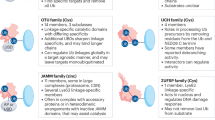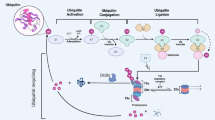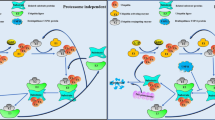Abstract
Degradation by the 26S proteasome of specific proteins that have been targeted by the ubiquitin pathway is the major intracellular non-lysosomal proteolytic mechanism and is involved in a broad range of processes, such as cell cycle progression, antigen presentation and control of gene expression. Recent work, reviewed here, has shown that this pathway is often the target of cancer-related deregulation and can underlie processes, such as oncogenic transformation, tumour progression, escape from immune surveillance and drug resistance.
This is a preview of subscription content, access via your institution
Access options
Subscribe to this journal
Receive 24 print issues and online access
$259.00 per year
only $10.79 per issue
Buy this article
- Purchase on Springer Link
- Instant access to full article PDF
Prices may be subject to local taxes which are calculated during checkout
Similar content being viewed by others
Author information
Authors and Affiliations
Rights and permissions
About this article
Cite this article
Spataro, V., Norbury, C. & Harris, A. The ubiquitin-proteasome pathway in cancer. Br J Cancer 77, 448–455 (1998). https://doi.org/10.1038/bjc.1998.71
Issue Date:
DOI: https://doi.org/10.1038/bjc.1998.71
This article is cited by
-
Chlorogenic acid modulates the ubiquitin–proteasome system in stroke animal model
Laboratory Animal Research (2022)
-
Glioblastoma multiforme in patients with human immunodeficiency virus: an integrated review and analysis
Journal of Neuro-Oncology (2022)
-
The fine-tuning of proteolytic pathways in Alzheimer’s disease
Cellular and Molecular Life Sciences (2016)
-
Epigenetic control of the ubiquitin carboxyl terminal hydrolase 1 in renal cell carcinoma
Journal of Translational Medicine (2009)
-
PGP 9.5 expression in cutaneous keratoacanthomas and squamous cell carcinomas
Archives of Dermatological Research (2009)



